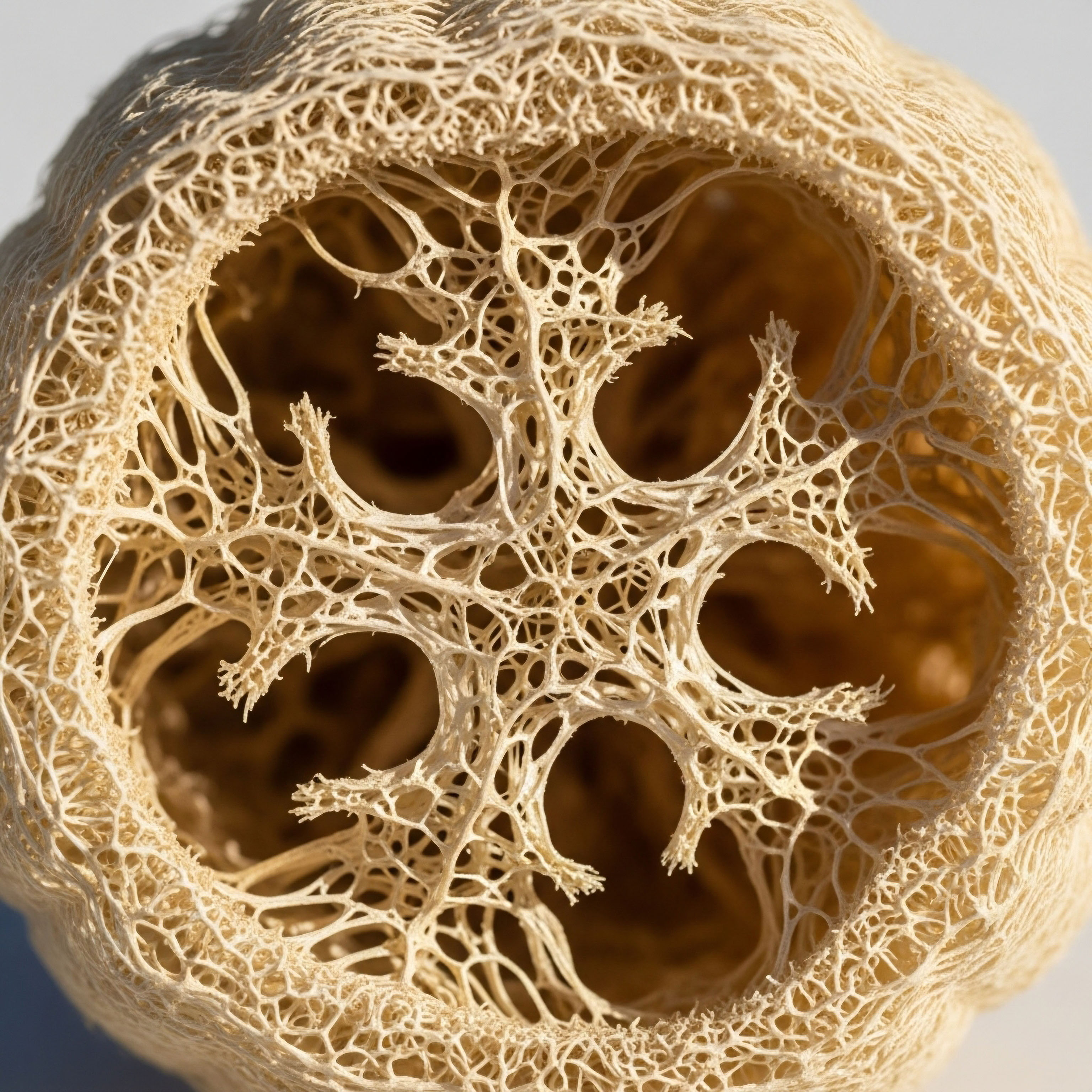

The Biological Mandate for Nocturnal Recalibration
The common perspective frames sleep as mere downtime, a passive necessity for recuperation. This view is fundamentally incomplete, failing to recognize the night as the body’s primary chemical synthesis and system-tuning laboratory. For the individual dedicated to peak vitality and performance, the night is not a void between active states; it is the engine room where the machinery of the next day is engineered at a molecular level. We examine the concrete biological consequences of compromising this critical window.

Endocrine Axis Synchronization
The endocrine system ∞ the body’s long-range communication network ∞ operates on precise, time-dependent schedules dictated by the central circadian clock. Disrupting this timing results in a direct penalty to anabolic signaling and metabolic control. The Hypothalamic-Pituitary-Gonadal (HPG) axis, for instance, exhibits strict temporal governance, coordinating reproductive and vitality hormone release with the light/dark cycle.
Testosterone production in men is heavily weighted toward nocturnal phases, peaking during Rapid Eye Movement (REM) sleep cycles. When sleep is curtailed, this vital androgen synthesis is directly suppressed. Data from controlled studies illustrate the severity of this impact ∞ healthy young men restricting sleep to five hours nightly for one week experienced a 10 to 15 percent reduction in circulating testosterone levels. This magnitude of decline is functionally equivalent to the hormonal shift associated with aging by a decade or more.

Growth Hormone Bolus Timing
The release of Growth Hormone (GH), essential for tissue repair, muscle synthesis, and fat mobilization, is not a slow drip but a series of powerful pulses, the largest of which occurs in the initial stages of deep, slow-wave sleep (NREM).
This initial bolus is intrinsically linked to the synchronization between the melatonin signal and the internal clock state. Missing this first deep sleep cycle means missing the most potent anabolic signal the body generates outside of direct exogenous administration. This deficit directly impairs recovery from physical stressors and slows the optimization of body composition.

Cognitive Network Integrity
Cognitive performance ∞ the speed of judgment, the fidelity of memory recall, and the capacity for sustained attention ∞ is functionally dependent on nocturnal maintenance cycles. During sleep, the brain executes critical housekeeping, specifically the clearance of metabolic waste products via the glymphatic system.
Sufficient sleep facilitates a 60% increase in interstitial space volume, allowing cerebrospinal fluid to successfully clear toxic cellular molecules, such as beta-amyloid, which is implicated in neurodegenerative pathology.
Sleep deprivation destabilizes the balance between the Default Mode Network (DMN) and the Fronto-Parietal Network (FPN), leading to impaired attention and reduced working memory capacity during wakefulness. The result is a compromised system where reaction time slows and complex decision-making degrades due to the accumulation of metabolic byproducts and neural fatigue.


Engineering the Optimal Chemical Environment
Mastery over performance necessitates treating the sleep state as a precisely controlled variable, not a passive consequence of the preceding day. The strategy involves aligning environmental inputs with internal physiological requirements to maximize the expression of desirable nocturnal outputs ∞ specifically GH pulses, robust testosterone cycling, and efficient neural maintenance.

Chronobiological Entrainment Protocols
The primary lever for tuning the nocturnal system is the strict alignment of the sleep-wake cycle with the suprachiasmatic nucleus (SCN), the master clock. Consistency is the mechanism that allows the peripheral clocks in metabolic and endocrine tissues to remain synchronized with the central pacemaker.
We structure the evening phase to prime the system for deep sleep initiation:
- Light Management: Aggressive minimization of blue and green spectrum light exposure in the two hours preceding intended sleep onset. This prevents the SCN from misinterpreting the signal, thus allowing the natural rise of the sleep-signaling hormone, melatonin.
- Metabolic Signaling: Avoiding ingestion of alcohol within four to six hours of bedtime is non-negotiable. Alcohol severely fragments sleep architecture, particularly impacting the crucial early cycles responsible for the initial GH release.
- Thermal Downregulation: Facilitating a slight drop in core body temperature signals to the hypothalamus that the active period is concluding, promoting the necessary physiological transition into NREM sleep.

Targeted Phase Maximization
The objective is not merely total time in bed, but maximizing the time spent in the hormonally significant stages ∞ deep NREM and REM. This requires an understanding of the relative density of these stages across the night.
| Sleep Stage | Primary Nocturnal Role | Performance Relevance |
|---|---|---|
| NREM Stages 3+4 (Deep Sleep) | Primary GH secretion window | Tissue repair, anabolic signaling, metabolic regulation |
| REM Sleep | Testosterone peak synthesis, memory consolidation | Cognitive processing, drive, hormonal maintenance |
A commitment to a consistent bedtime is the only proven method to reliably capture that essential first deep sleep phase, as delaying sleep initiation often means the body misses the window for that initial, potent hormonal pulse.


The Timeline for Systemic Uplift
The adoption of a rigorous nocturnal protocol is an investment with predictable returns, though the timescale for observable systemic shifts varies based on the physiological parameter being addressed. The transition from acute performance decrements to chronic systemic enhancement requires phased engagement.

Acute Phase Response Days One to Seven
The immediate benefits register within 24 hours. Attention, vigilance, and working memory show marked improvement simply by avoiding the prior night’s sleep debt. Furthermore, a single night of recovery following a sleep restriction period allows for a rapid restoration of some neurocognitive function, though the complete recovery of complex tasks may lag. This initial phase confirms the hypothesis ∞ improved input yields superior output.

Mid-Term Hormonal Rebalancing Weeks Two to Six
The endocrine system requires a consistent signal before it resets its set-points. For individuals coming from a chronic state of partial sleep restriction, consistent 7-9 hour sleep windows allow the HPG axis to normalize its rhythm. We observe measurable, upward titration in baseline testosterone levels and a more predictable diurnal pattern in cortisol levels during this window.
This period is when strength plateaus begin to lift and body composition efforts become more responsive to training input, as the catabolic signaling from chronically elevated cortisol subsides.

Longevity Pathway Calibration Months Three Plus
The most significant, system-level transformation involves the cumulative effect on neuroprotection and metabolic stability. Consistent, high-quality sleep supports the continuous, efficient operation of the glymphatic system, which is the body’s primary defense against accumulating neural plaque. This long-term fidelity in waste clearance, combined with stabilized metabolic hormone profiles, positions the system for resilience against age-related decline. This is the ultimate performance metric ∞ sustained high function across decades.

The Unnegotiable Command over Biological State
The evidence is not suggestive; it is definitive. Nighttime physiology is not a luxury function to be scheduled around a demanding day; it is the foundational substrate upon which all daytime performance ∞ cognitive, physical, and emotional ∞ is constructed. To treat sleep as a negotiable commodity is to deliberately operate your high-performance system with degraded core components.
The commitment to nocturnal excellence is the single most powerful, yet often ignored, intervention in the domain of human optimization. The mastery you seek in the light is only achievable through the absolute command you establish in the dark.



